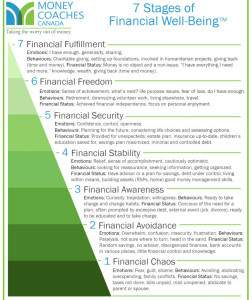How many of us see our money as a trusted, supportive friend who is there for us at all stages of our life? Or, is your experience with money more like a trip to the dentist – you know it’s good for you, but oh, so unpleasant. Maybe you’re more like Scarlet O’Hara with your money – “I’ll think about it tomorrow”. For some of us our money plays out like a controlling parent who spoils our fun and restricts our freedom. Or perhaps your dreams of comfort and ease in retirement are eclipsed by visions of yourself as a bag lady?
I know I’m not painting a pretty picture here, but I’ve been in the financial planning business for over 20 years and I am constantly amazed by how few people I meet that have a joyful, healthy, supportive relationship with their money. Even people who have a lot of it! With so much focus on money in our culture, it strikes me as tragic that we spend so much energy on it – either avoiding it, obsessing about it, worrying about it, controlling it, but where’s the joy, the satisfaction, the reward?
Most of us have very complex relationships with money and it has a very powerful influence on our life – on the work we chose, our personal relationships, our sense of self. So we certainly have lots of reasons to a have good, healthy relationship with money. So why don’t we? What stops us from making friends with our money?
Mostly I don’t think that it’s cash that we lack, but an awareness of what role it plays in our life, what our beliefs are and what emotions are tied into our dealings with money. Most of us also lack good role models – we see corporate greed on the one hand, poverty on the other – god knows many of our parents didn’t know how to handle money successfully. We aren’t taught about it in schools and we don’t often get a chance to talk openly and honestly about money and our feelings about it.
 As Money Coaches we help people progress through the 7 Stages of Financial Well-Being™ to ultimately achieve financial fulfillment. A great way to set goals is to recognize which stage you are in and to understand what you need to do to move to the next stage. You may be able to determine where you are by reading the descriptions of each stage in the graphic (click the image to enlarge), but you can also download our 7 Stages of Financial Well-Being™ Quiz to see where you stand.
As Money Coaches we help people progress through the 7 Stages of Financial Well-Being™ to ultimately achieve financial fulfillment. A great way to set goals is to recognize which stage you are in and to understand what you need to do to move to the next stage. You may be able to determine where you are by reading the descriptions of each stage in the graphic (click the image to enlarge), but you can also download our 7 Stages of Financial Well-Being™ Quiz to see where you stand.

